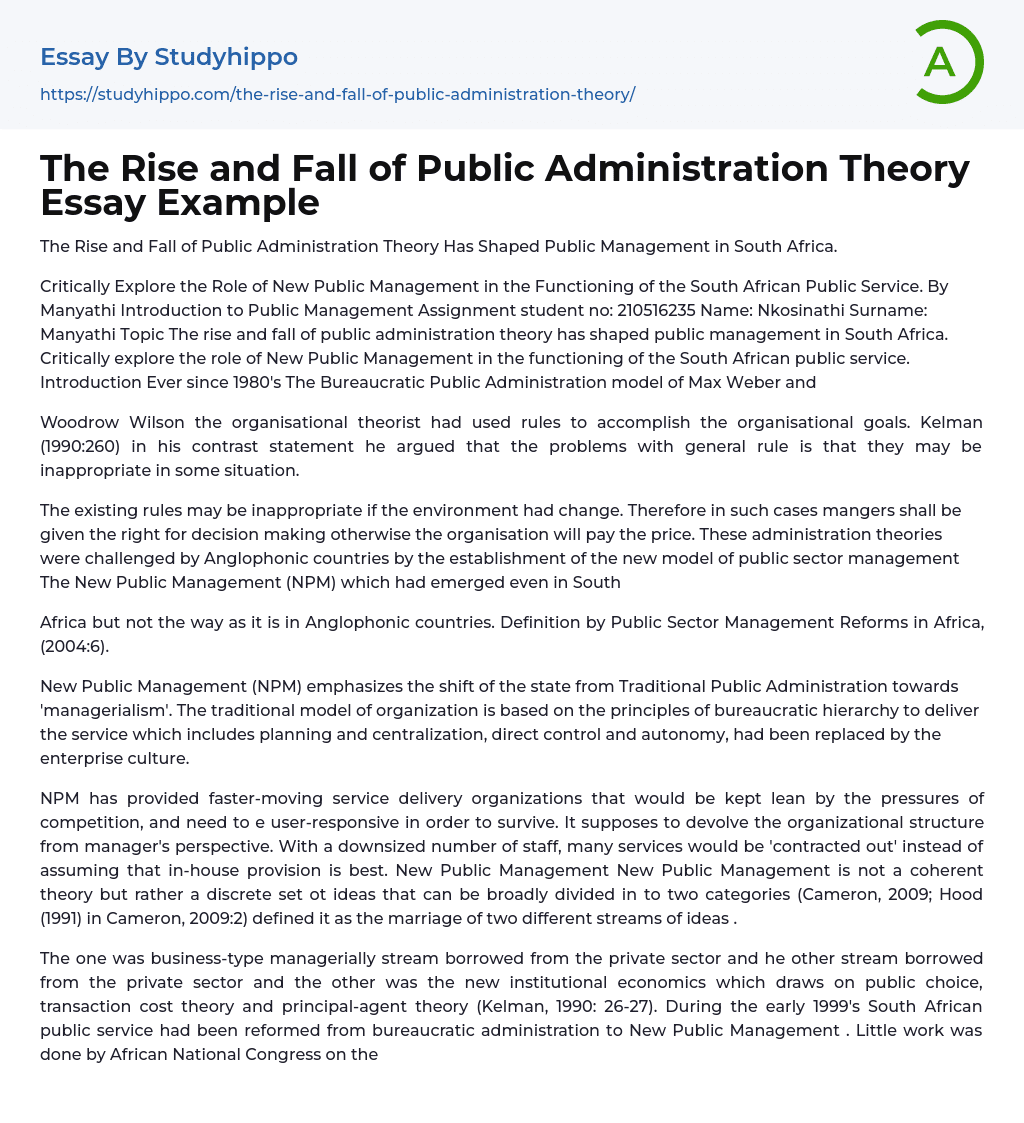The topic of this introduction to public management assignment is the impact of public administration theory on public management in South Africa, with a critical examination of the role played by New Public Management (NPM) in the country's public service. The traditional bureaucratic public administration approach of Max Weber and Woodrow Wilson, which relied on rules to achieve organizational goals, was challenged by critics who argued that these rules could be inappropriate in certain situations. This led to the emergence of NPM in Anglophonic countries, including South Africa, where it has been implemented differently. According to Public Sector Management Reforms in Africa (2004:6), NPM refers to a model of public sector management reform.The concept of New Public Management (NPM) involves the shift of state practices from Traditional Public Administration to a more managerial approach, which promotes an enterprise culture
.... This model strays away from bureaucratic hierarchy and instead emphasizes the importance of competition and user-responsiveness in providing efficient service delivery. In order to achieve a lean operation, NPM suggests reducing staff numbers and outsourcing certain services rather than relying solely on in-house provision. NPM is a collection of ideas stemming from two streams borrowed from the private sector and new institutional economics, drawing upon public choice, transaction cost theory, and principal-agent theory. In the early 1990s, South Africa's public service underwent a transformation from bureaucratic administration to NPM.The African National Congress did not focus much on the post-apartheid public service, as noted by Cameron (2009:4). The adoption of New Public Management has been influential in shaping public service reforms in South Africa. This new bureaucratic approach emphasizes rule-based strategies for achieving goals, but
the use of rules can inhibit innovation and uniqueness (Kelman, 1990: 26-27). South Africa's constantly changing environment makes rules management unsuitable. The introduction of market paradigms and private values in the public sector through New Public Management has been widely debated and criticized, with some arguing that it conflicts with traditional public administration practices and community ideals (Cameron, 2009:4-5). Mafunisa argues that the government should prioritize "public profit" over private profit. The South African context highlights two broad categories of New Public Management.
- Finance essays
- International Business essays
- Macroeconomics essays
- Barriers To Entry essays
- Microeconomics essays
- Pricing essays
- Profit essays
- Consumerism essays
- Export essays
- Free Trade essays
- International Trade essays
- Compensation essays
- Monopoly essays
- Trade essays
- Industry essays
- Warehouse essays
- Economic Development essays
- Economic Growth essays
- Inflation essays
- Taxation essays
- Central Bank essays
- Monetary Policy essays
- Economy essays
- Gross Domestic Product essays
- Recession essays
- Capitalism essays
- Economic System essays
- Materialism essays
- World economy essays
- American Dream essays
- resources essays
- Max Weber essays
- Employment essays
- Minimum Wage essays
- Unemployment essays
- Human Development essays
- Income Inequality essays
- Economic Inequality essays
- Money essays
- Financial Accounting essays
- Market Segmentation essays
- Supply And Demand essays
- Purchasing essays
- Forecasting essays
- Legacy essays
- Bank essays
- Corporate Finance essays
- Financial News essays
- Financial Ratios essays
- Financial Services essays




